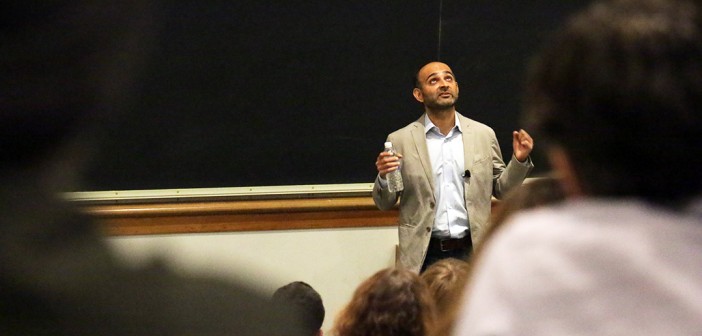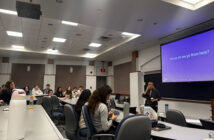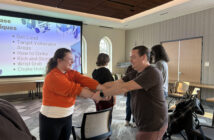Award-winning novelist Mohsin Hamid applied his life and work to the exploration of globalization while speaking to Lehigh students on the evening of Sept. 9.
“Things are changing much more rapidly than they once did and that creates in us an anxiety,” Hamid said. “We often speak of globalization as a way of talking about that anxiety.”

Distinguished author Mohsin Hamid gives a talk to Lehigh students in the Rauch Perella Auditorium on Wednesday, Sept. 9, 2015. The presentation was part of the Critical Globalization lecture series that is promoting a social change initiative. (Nadine Elsayed/B&W photo)
To explore this transnational and cross-cultural anxiety, Hamid shared life experiences and used his novels Moth Smoke, The Reluctant Fundamentalist and How to Get Filthy Rich in Rising Asia. With dual citizenship in Pakistan and the United Kingdom, along with 18 years of residency in the United States, Hamid has related his personal findings to characters within his books to further examine one’s self and personal identity.
“In this face of a globalized life, I wanted to make sense of things,” Hamid said.
It was with that inspiration that gave birth to his first novel, Moth Smoke, which follows a Pakistani man through various life struggles. Hamid’s ability to write about a Pakistani man through the perspective of an American made him aware of what he calls the “similarity phenomenon.”
He said due to globalization, the superficial comparisons that often happen with cultural differences are being replaced with the idea that young Americans do act similarly to young Pakistanis.
However, after the events of Sept. 11, Hamid’s world dramatically changed as he saw the “reassertion of tribalism” ensue on a global level. Being a hybridized Pakistani American was no longer socially acceptable. He was forced to pick a side just as Islamism and Americanism become two mutually exclusive entities.
Living as a Pakistani American in a post-Sept. 11 world inspired The Reluctant Fundamentalist. The format of the novel forces readers to trust their gut and make a decision, without enough information, about the main character. Hamid compares this decision one must make as a reader with the decisions all humans must all make as they all face a world where decisions must be made with incomplete information. He said it is through these decisions that we find our true self and identity.
“It was interesting hearing him speak about the effect Sept. 11 had on his everyday life and how those experiences shaped The Reluctant Fundamentalist even though he began writing the book before the event,” Ellen Moroney, ’16, said.
As Hamid’s post-Sept. 11 life began to take shape, he asked himself how we should all move forward. Hamid said “we are in love with the past,” however things cannot go back to the way they were because it is dangerous and destructive. It was this thought process that inspired his personal self-help book How to Get Filthy Rich in Rising Asia.
“I think one of the reactions to globalization that we do see is, it’s frightening, globalization,” Hamid said.
While Hamid admitted he does not know the solution to globalization, he believes there is a way to make globalization more bearable. Previous ways included the family unit, religion and folk stories, all of which are losing track as the world moves away from a unified mentality. Therefore, Hamid suggested love as the way to manage globalization in this 21st century world.
The type of love Hamid suggested is not possessive. It is a love that alters one’s relationship with time. It is a love already out in the world, but trapped in old ideas. Hamid believes it is necessary to explore the wisdoms in the world and then find some kind of meaning in these wisdoms in which everyone can share.
“I’ve been following his career from the beginning,” said Robert Rozehnal, an associate professor and the director of the Center for Global Islamic Studies. “I think his novels put a personal flesh and blood face on 21st century globalization like no other novelist I know of.”
Hamid’s lecture was the first of the Critical Globalization lecture series, presented by The Globalization and Social Change Initiative and co-sponsored by The Center for Global Islamic Studies.
Hamid previously visited Lehigh in the fall of 2012 after his book, The Reluctant Fundamentalist, was required reading for first-year students during the summer of 2012.






Comment policy
Comments posted to The Brown and White website are reviewed by a moderator before being approved. Incendiary speech or harassing language, including comments targeted at individuals, may be deemed unacceptable and not published. Spam and other soliciting will also be declined.
The Brown and White also reserves the right to not publish entirely anonymous comments.
1 Comment
Pingback: Water is Life – Somewhere Beyond